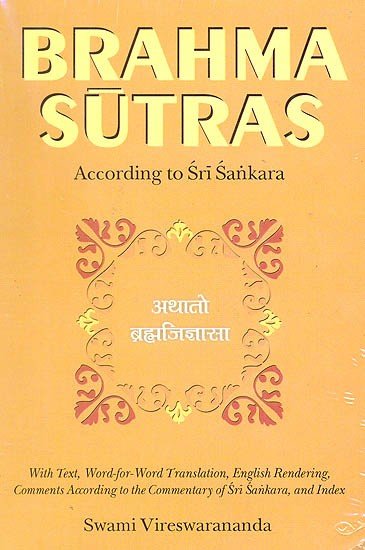Brahma Sutras (Shankara Bhashya)
by Swami Vireshwarananda | 1936 | 124,571 words | ISBN-10: 8175050063
This is the English translation of the Brahma-sutras including the commentary (Bhashya) of Shankara. The Brahma-sutra (or, Vedanta-sutra) is one of the three canonical texts of the Vedanta school of Hindu philosophy and represents an early exposition the Vedantic interpretation of the Upanishads. This edition has the original Sanskrit text, the r...
Chapter III, Section IV, Adhikarana XVII
Adhikarana summary: There Is No Difference In Liberation, I.e. In The Cognition Of Brahman—it Is Of One Kind In All Cases
Sutra 3,4.52
एवं मुक्तिफलानियमः, तदवस्थावधृते॥ ५२ ॥
evaṃ muktiphalāniyamaḥ, tadavasthāvadhṛte || 52 ||
evaṃ—Like this; muktiphala-aniyamaḥ—there is no rule with respect to Liberation, the fruit (of Knowledge); tat-avasthā-avadhṛte—because the Sruti asserts that state (to be immutable).
52. With respect to Liberation, the fruit (of Knowledge) there is no rule like this, because the Sruti asserts that state (to be immutable).
In the last Sutra it was seen that Knowledge may result in this life or the next according to the absence or presence of obstructions and the intensity of the means adopted. Similarly a doubt may arise that there may be some such rule with respect to Liberation also, which is the fruit of Knowledge. In other words, the question is whether Liberation can be delayed after Knowledge, and whether there are degrees of Knowledge according to the qualifications of the aspirant. This Sutra says that no such rule exists with respect to Liberation. Because the Sruti texts assert that the nature of final release is uniform, without any variations of degree in it. The state of final release is nothing but Brahman. “The knower of Brahman becomes Brahman,” and there can be no variety in it, as Brahman is without qualities. Difference is possible only where there are qualities, as in the case of the Saguna Brahman, about which according to difference in Vidyas there may be difference in the cognitions. But with respect to the cognition of Brahman, it can be only one and not many. Neither can there be any delay in the attainment of Liberation after Knowledge has dawned for knowledge of Brahman itself is Liberation.
The repetition of the clause ‘Because the Sruti asserts that state’ is to show that the chapter ends here.
